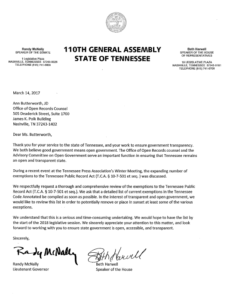McNally, Harwell seek review of Tennessee open records exemptions
The speakers of the House and Senate have asked the Office of Open Records Counsel for a “thorough and comprehensive review” of the various exemptions to the Tennessee Public Records Act, reports Joel Ebert in a story in The Tennessean.

Letter from McNally and Harwell asking for a thorough review of the exemptions to the Public Records Act.
“We ask that a detailed list of current exemptions in the Tennessee Code Annotated be compiled as soon as possible,” says the letter from State Sen. Randy McNally, R-Oak Ridge, and State Rep. Beth Harwell, R-Nashville, to Open Records Counsel Ann Butterworth. “In the interest of transparent and open government, we would like to review this list in order to potentially remove or place in sunset at least some of the various provisions.”
“…We would hope to have the list by the start of the 2018 legislative session.”
An excerpt from the The Tennessean story:
The request coincides with Sunshine Week, a nationwide effort to highlight the role of the public’s access to government information, and comes less than a month after the speakers were asked about the possibility of including a sunset provision on any new exemptions that are added to the public records law.
During a panel discussion with reporters in February, McNally said he would be willing to “pursue” the exemption sunset idea.
Harwell said she would be open to establishing a task force that could revisit the idea of having new exemptions face a sunset.
The idea of applying a sunset to open records exemptions was presented to Harwell and McNally during a session with the Tennessee Press Association in February. Adam Yeomans, the director of southern states for the Associated Press operations and who is based in Nashville, asked both leaders if they would consider such a process. He cited Florida laws as an example. (Yeomans is TCOG’s board vice president and representative on the Advisory Committee on Open Government, which advises the state’s Open Records Counsel.)
McNally has a history of promoting open government and transparency. In 2006-07, he was the chairman of the Sunshine in Government study committee, which resulted in several improvements to the public records law that created better access to records and created the Office of Open Records Counsel.






